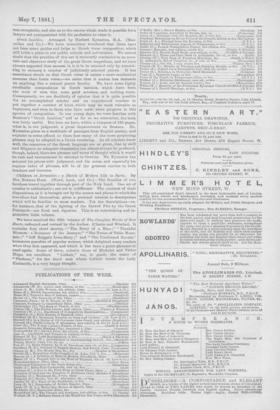Greek Iambics. Arranged by Herbert Kynaston, M.A. (Mac- millan and
Co.)—We have sometimes wondered that there have not been more guides and helps to Greek verse composition, which still holds a place in our public schools and universities. We cannot doubt that the practice of this art is eminently conducive to an accu- rate and observant study of the great Greek tragedians, and we have always supposed that success in it is to be attained only by commit. ting to memory a number of judiciously-selected pieces. It has sometimes struck us that Greek verse is rather a more mechanical exercise than Latin verse,—we mean that it makes less demands on anything like a natural poetic faculty. We have some highly creditable compositions in Greek iambics, which have been the work of man who were good scholars, and nothing more. Consequently, wo are decidedly of opinion that it is quite possible for an accomplished scholar and an experienced teacher to put together a number of hints which may be most valuable to beginners, and even to those who have made some progress in this species of composition. In our young days, we were familiar with Beatson's "Greek Iambics," and as far as wo remember, the book was fairly useful, But here we have, within a compass of 150 pages, what is, in our judgment, a great improvement on Bentsen. Mr. Kynaston gives us a multitude of passages from English poetry, and explains in notes affixed to them how many of the inure perplexing phrases may be adapted to a Greek rendering, As all scholars know well, the resources of the Greek language are so groat, that by skill and diligence an adequate translation can almost always be produced, though, indeed, there are phrases and turns of thought which it would be rash and venturesome to attempt to Grecise. Mr. Kynaston has selected his pieces with judgment, and his notes, and especially his copious index of phrases, will be of the greatest service to both teachers and learners.


































 Previous page
Previous page